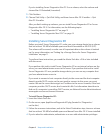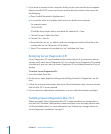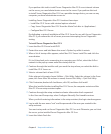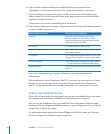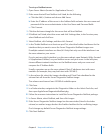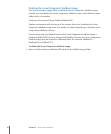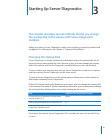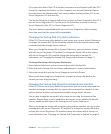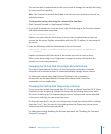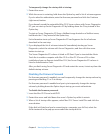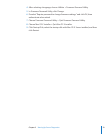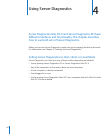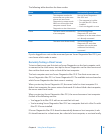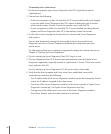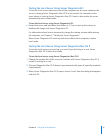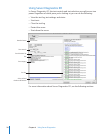
Chapter 3 Starting Up Server Diagnostics 21
You must be able to authenticate as the root account to change the startup disk using
the command-line interface.
Note: The Terminal commands described in this task are case-sensitive, and must be
entered as shown.
To change the startup disk using the command-line interface:
1 Open Terminal (located in /Applications/Utilities/).
2 If you want to connect to a remote server, enter the following in the Terminal window,
and authenticate when requested:
ssh username@serveraddress
Replace username with the short name of a user who can authenticate as the root
account on the server. Replace serveraddress with the URL, IP address, or host name of
the server.
3 Enter the following, and then authenticate as the root account:
sudo bless -folder "/Volumes/volumename/System/Library/CoreServices"
-setBoot
Replace volumename with the name of the volume you want to start up from.
When you’re done using Server Diagnostics, change the startup disk back to the
volume you were using previously.
Changing the Startup Disk Using Apple Remote Desktop
If you have Apple Remote Desktop, you can change the startup disk of remote
computers to an internal volume or connected portable storage device volume.
For information about using Apple Remote Desktop to set a computer’s
startup disk, see the Apple Remote Desktop Administrator Guide, located at
www.apple.com/remotedesktop.
Changing the Startup Disk Temporarily at Startup
If your server has trouble starting up Mac OS X Server or doesn’t have Mac OS X Server
installed, you can temporarily change the startup disk by holding down a key while
the server is starting up. This requires that you have a keyboard and mouse attached
to the server and that you can restart the server.
If a rmware password is set, you can’t temporarily change the startup disk by holding
down the D or F1 key. You can do it by holding down the Option key, but you must
authenticate with the rmware password.
For information about disabling the rmware password, see “Disabling the Firmware
Password” on page 22.



